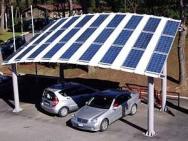
Nice enough to live in Scores of small companies from chimney sweeps to solar panel installers are seeing a boom in business as people faced with soaring fuel bills look for cheaper energy deals. Solar panels, typically lining the roofs of buildings, can now be found across America in more eccentric forms — shingles, windows, awnings and free-standing carports.
With the average household’s annual energy bill now more than $2,000 (£1,300), comparatively cheaper sources of household energy such as solar power and solid fuel are tempting, while last week’s Government initiative on heavily subsidised or free home insulation is expected to be a boon to suppliers..
New multipurpose solar systems are becoming more popular as the prices on photovoltaic systems decline across the board, while demand rises and the solar field grows.
“Solar energy today now makes economic sense in a way that has really evolved over the years so that entrepreneurial companies are able to meet the needs of the marketplace,” said Neal Lurie, spokesman for Boulder-based American Solar Energy Society. “Innovation and technology can meet customer needs and help drive profits in the process.”
With a lot of successful and knowledgeable people now working in solar, experts have begun to branch off so that they are no longer simply installing the traditional technologies, said Blake Jones, president of Namaste Solar Electric.
For example, the Lumos company, also based in Boulder, has created a line of standard products that can be shipped and assembled anywhere in the world.
“The goal is to develop a new product that we could literally bring with a helicopter or a truck to any remote location and have locals
install it,” said Scott Franklin, president of Lumos.
The company is now making the “power pod,” an off-grid, easy-to-assemble, solar system in a shipping container. Lumos also makes, sells and ships the “powerport,” which Franklin described as a carport in a box.
“It’s another way to incorporate solar into the architecture,” said Franklin. A solar carport is helpful if the roof of your home is oriented in the wrong direction or if you don’t have room for solar panels on your
roof, he said. These carports and solar garages covering expansive parking lots will become more convenient and appreciated as hybrid and electric vehicles become more common, Lurie said.
Namaste’s Jones said the popularity of multipurpose solar shades, awnings, carports and garages is growing. Yet, even as numbers increase a very small percentage of people are interested
in the specialized solar products.
Customized solar structures can be expensive, but the mass-produced standardized structures that Lumos is marketing should combat these high costs.
“We’ve done all the engineering, all the design is done, we can do it much faster and, we’d like to think, better than a homeowner doing it on their own,” said Franklin of his built and ready-to-order products.
“There’s definitely a premium but it’s very cost-competitive with traditional solar installations,” he said.
In the UK, Jim Lambeth, general manager of the Solid Fuel Association, said the demand for alternative heating appliances had gone “mad,” with sales of wood-burning and other stoves up 40 per cent in the past year.
The Solar Trade Association said its members had seen an increase in demand for solar panel water heating systems while the National Insulation Association said there had been one million installations so far this year, up a third on last year.
Tony Hardiman, managing director of Dyson Insulations, based in Brighouse, West Yorkshire, said: “The business has grown significantly — our capacity has increased by two and a half times compared with what it was last year.”
The business has a staff of about 320 and forecasts even better sales for next year.
Wayne Bennett, founder of Bedford-based solar heating company Solaris, says installations have grown by 20 per cent in the past year. “People have seen their bills shoot up and are trying to mitigate that,” he said.
A record number of households are also opening up old fireplaces or installing solid fuel stoves.
AJ Wells & Sons, a family-run stove making business on the Isle of Wight, saw sales in the year to the end of June rise ten per cent to a record £11 million.
Orders last month alone for multi-fuel and wood burning stoves have boosted production five-fold compared with the same time last year. Sed Wells, marketing manager and one of nine family members in the business, said: “We have seen a massive increase in sales. We are doing considerably better than last year and this will be a very good year for us, mainly due to rising gas and oil prices.”
Chimney sweeps are also cleaning up. Sweep Martin Glynn, who also heads the National Association of Chimney Sweeps, said there had been a resurgence in the popularity of fireplaces as a secondary form of heating.
One Response
I was surprised to read so much about burning solid fuel in an article on solar carports. Although burning a wood stove can offer a level of energy independence, it is not the most environmentally responsible or socially appropriate choice one can make. It did stir up a thought in my mind however: I wonder how many trees it takes (generally speaking) to absorb and compensate for the use of a typical winter’s worth of wood stove burning?
Our problem isn’t that we cannot afford to produce any pollutants . . . our problem is simply that we cannot afford to produce more pollutants than the environment is able to process in a reasonable time and fashion. It is all about balance.